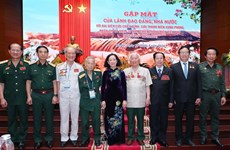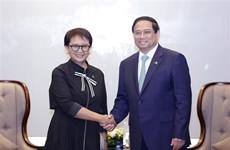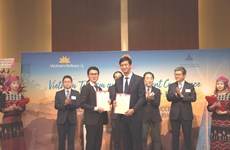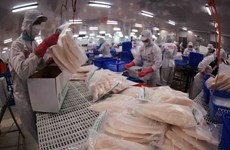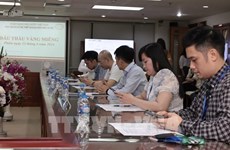Official discusses TPP challenges for Vietnam
The Vietnam News Agency has talked with Luong Hoang Thai, head of the
Ministry of Industry and Trade’s Multilateral Trade Policy Department,
on some of the challenges facing Vietnam during the negotiations for the
Trans-Pacific Partnership negotiations (TPP).
The Vietnam News Agency has talked with Luong Hoang Thai, head of the
Ministry of Industry and Trade’s Multilateral Trade Policy Department,
on some of the challenges facing Vietnam during the negotiations for the
Trans-Pacific Partnership negotiations (TPP).
The official said all involved countries so far have progressed to the final phase of the negotiation process, and they are making efforts to technically conclude the negotiations in the first quarter or early in the second quarter this year in order to submit it to the leaders for approval.
He noted that the TPP is a treaty of a very high standard, perhaps even an unprecedented standard, and this causes difficulties for most of the countries involved, especially in some key fields such as protecting intellectual property rights or opening up the goods market.
According to Thai, Vietnam’s biggest difficulty is how to get other countries to open their market to Vietnamese goods and services at a degree at which Vietnamese enterprises can exploit in the future, especially for main export commodities like garments and textiles, footwear, agro-products and seafood.
He continued to say that another big challenge is that Vietnam has to adjust laws to suit international standards, especially in intellectual property protection and customs management. Vietnam also has to amend laws on labour to conform to the criteria of the International Labour Organisation (ILO), he added.
Responding to opinions that little information is available for the domestic business circle regarding the TPP, the official said one of the rules of the negotiation process is that all member nations have to keep negotiation information secret until the end of the process.
He added that given the TPP’s expected great impacts on the domestic economy and business community, the Prime Minister has instructed negotiation agencies to regularly consult those directly influenced by these agreements.
Accordingly, the Ministry of Industry and Trade (MoIT) has coordinated with other ministries to collect information and feedback from business communities across the country, Thai said, adding that the ministry has also consulted business representative via the Vietnam Chamber of Commerce and Industry or related trade associations on each specific issue.
He said in the coming time, the MoIT and the negotiation delegation will continue to collect opinions from enterprises, while timely make information available in line with the negotiation’s rule, so enterprises can prepare to take advantage of the TPP as quickly as possible.
The TPP is one of the world’s biggest Free-Trade Agreement (FTA) with the combined gross domestic product (GDP) of all 12 participant countries accounting for 40 percent of the global GDP.-VNA
The official said all involved countries so far have progressed to the final phase of the negotiation process, and they are making efforts to technically conclude the negotiations in the first quarter or early in the second quarter this year in order to submit it to the leaders for approval.
He noted that the TPP is a treaty of a very high standard, perhaps even an unprecedented standard, and this causes difficulties for most of the countries involved, especially in some key fields such as protecting intellectual property rights or opening up the goods market.
According to Thai, Vietnam’s biggest difficulty is how to get other countries to open their market to Vietnamese goods and services at a degree at which Vietnamese enterprises can exploit in the future, especially for main export commodities like garments and textiles, footwear, agro-products and seafood.
He continued to say that another big challenge is that Vietnam has to adjust laws to suit international standards, especially in intellectual property protection and customs management. Vietnam also has to amend laws on labour to conform to the criteria of the International Labour Organisation (ILO), he added.
Responding to opinions that little information is available for the domestic business circle regarding the TPP, the official said one of the rules of the negotiation process is that all member nations have to keep negotiation information secret until the end of the process.
He added that given the TPP’s expected great impacts on the domestic economy and business community, the Prime Minister has instructed negotiation agencies to regularly consult those directly influenced by these agreements.
Accordingly, the Ministry of Industry and Trade (MoIT) has coordinated with other ministries to collect information and feedback from business communities across the country, Thai said, adding that the ministry has also consulted business representative via the Vietnam Chamber of Commerce and Industry or related trade associations on each specific issue.
He said in the coming time, the MoIT and the negotiation delegation will continue to collect opinions from enterprises, while timely make information available in line with the negotiation’s rule, so enterprises can prepare to take advantage of the TPP as quickly as possible.
The TPP is one of the world’s biggest Free-Trade Agreement (FTA) with the combined gross domestic product (GDP) of all 12 participant countries accounting for 40 percent of the global GDP.-VNA







